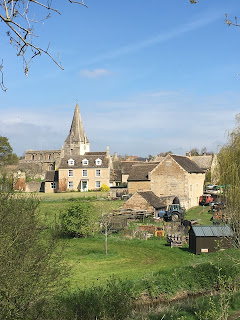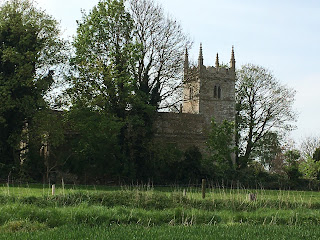IN THE SHADE
As I write, it’s only a week until the Coronation of King Charles when earthly and heavenly kingdoms will seem to touch. Charles officially becomes Head of the Church of England. We state our allegiance to him, fingers crossed or not. He re-states his allegiance to almighty God. On the day, most people watching probably won’t be thinking much about any of this. Rather more perhaps about the expression on the Duke of Sussex’ face, or what Katharine’s wearing.
Travel guide
The geography of the
Kingdom
Is complicated.
As you know,
There are rivers of
mercy and
Unexpected springs of
grace.
The fields are
invariably white unto harvest
And the views from the
heights unparalleled.
But.
Every valley is likely
to be exalted.
At short notice
Every mountain and hill
may be made low.
The rough places may
look plain but
Stumbling and falling
In these green pastures
is not unknown.
Suddenly
You may find yourself
out of your depth,
And crying out
From the apparently
still waters.
The population
Are a very mixed bunch.
Some you’ll like and
some
Are simply bloody
impossible,
Failing to agree on the
least thing.
The economics are
hopeless.
Everyone believes they
know the value of everything
While evidently knowing
the price of nothing.
And above all this –
the King!
Extraordinary, elusive,
magical even.
But when he speaks,
what does he mean?
When he goes walkabout
How can he be followed?
But I’ll tell you
something.
This is a fascinating
country.
I’d rather be nowhere
else.
The last place we
visited was dreadful.
(Dedicated to Mike Town, organist, Christian and geographer, who as he’s done for many others, nurtured in me a love of walking I might otherwise have mislaid.)
Is
King’s Cliffe a village or a small town?
Once it was definitely the latter, the ‘Candleford’ to a number
of ‘Lark Rises’. There’s a splendid variety of Georgian architecture,
and the inhabitants are obviously and justly enthusiastic about their heritage.
The railway came here slightly later than it did elsewhere, but with a
population of over twelve hundred people in Victorian times it was always relatively
substantial and independent. When I was a young R.E. teacher, there was a
subject Resources Centre in Northampton but also one in King’s Cliffe - not
Oundle, nor Brackley – so even then it had recently been acknowledged as an
Important Place. However, post-Beeching, KC was already receding into the
sticks.
Shops in villages mostly disappeared a long time ago. Our previous house in Weston Favell was designed and built by lovely Maurice Walton, architect and priest, in the space Dixon’s the butcher had occupied not so long before. The enterprise shown in establishing and maintaining the Barrowden village shop in Rutland is an exception to the rule about local amenities, but it survives on volunteer assistance. In King’s Cliffe there’s a Londis supermarket, a greengrocer, a café, and a few pubs. There are three working churches too.
Increasingly
retail is being flung out from our towns to soul-less shopping parks on the
perimeters. Northampton’s character has changed hugely: apart from the students
accommodated there, a large proportion of footfall into the town centre will henceforth
be due to those wishing to drink or gamble. In consequence the place feels
increasingly menacing by day and - especially - by night. I feel the maudlin
spirit of Philip Larkin descending upon me…
What makes a town ‘a town’?
Is it a mayor?
Or a little statue
Stuck up in the square?
Is it the trade
By which it’s known
Shoes, or hats, or
fancy lace
Setting it above
Your average place?
And what of its church?
Is it well-attended,
grand,
Coiffed and choired,
Precise and planned?
Is it still a little
sun
Round which its
satellites
Spin and run
Awed by splendour
Of function and form?
No.
Old patterns of thought
Have ceased to be the
norm.
Intermediate size won’t
pay the bills.
Each individual demands
his way
To express herself.
Towns are done,
A new age begun.
Only I and the city
signify.
The middle ground is in
decay.
It’s falling asleep and
soon will die.
Tomorrow perhaps
Or the following day.
In
the above poem I’m thinking of the Church in rural areas too. Unsurprisingly people
are affectionate about their immediate parish. And good on them! Ecological
considerations alone ought to drive us (lol) to walk to our C. of E.
local. The current sparse, intermittent footfall in so many churches is
insufficient to sustain them financially.
‘It’s our weekend with the grandchildren…’. So, even if it’s not
official policy, the C. of E. will effectively pressure congregations to amalgamate,
or at worst to de-camp to the nearest town. Inevitably some folk will stay at
home instead and reduce their religion to Songs of Praise, and in any
case (see above!) the town centres are in trouble. They’re not necessarily the
best places for the elderly and vulnerable to go on a cold winter’s night. Some,
maybe not only evangelicals, will rejoice and say that of course the Faith must
return to its roots: we must worship where the people are - in bright school
halls, community centres or industrial units. But what of those ancient
buildings, prominent in the village landscapes, testimonies to so many
centuries of witness and discipleship?
What will those communities feel when the church windows go dark? Won’t everyone
feel reduced, believers or not? Scarcely visible spider’s threads of
connection to Jesus among the more elusive names on our electoral rolls will be
destroyed.
Fineshade
Fineshade is fair, is
green, yet sad.
Trees compensate for
glories past
Whispering hints at
what lies here
Beneath the grass.
Fineshade was hearth,
was home, was all
To devotees of prayer
and fast.
And pious bones are
buried here
Beneath the grass.
Fineshade speaks, is
eloquent, is clear
That foolish finery at
last
For all its excess is
lost
Beneath the grass.
Fineshade still joy, still
light, still balm.
Celebrates but holds a
glass
To our youthful,
lissom, careless play
Upon the grass.
Would the poem be better without the third stanza? The ‘rule of three’ is such a powerful device in literature and comedy, and like the difference between a three legged stool and a four legged chair – the one always stable, the other not - four stanzas doesn’t seem quite right, even if it feels necessary for the story-telling.
Beyond
King’s Cliffe lies one of the largest tracts of ancient forest still extant
round here. On its far side, near the A43 at Fineshade, is the site of what was
successively 1) a Stephen and Matilda-era castle 2) an Abbey, relatively gently
re-purposed into 3) a stately home after Henry. This burned down and was
replaced by a Georgian pile which was finally delapidated in the 1960s. In
recent years there’s been quite a struggle to prevent holiday development adjacent
to the Abbey site. There’s a jolly caravan park. You can eat a Forestry
Commission ice-cream in the Visitors’ Centre, and buy your pooch things he will
love. Be careful not to turn it into Center Parcs #2 guys…
Apethorpe – King’s Cliffe – Fineshade – King’s Cliffe – Apethorpe via a figure of eight route. 18 km. 5 hrs. max 17 degrees – rather remarkably, the warmest day so far this year. At times quite boggy and difficult underfoot particularly in the lower (best) part of Westhay Wood. A couple of shy cuckoo calls. A muntjac bearing towards me, then veering sharply away on the forest break in upper Westhay, like a misbegotten cross between a sheep and a wolf. A great walk – one of the best in Northamptonshire IMO. No adders – they’re there, but hiding. As you know the UK’s only venomous snake is hard to find. I’ve never seen one alive in the wild.
‘I think I take after my mum…’ observed
a bloke eating his sandwich at Fineshade’s ‘Top Lodge (well, I
think we’ll be the judge on the accuracy of its ‘topness’!). This reminded me
of an ex-pupil of mine, sixteen years old at the time, who once said in rather
shocked/disturbed tones, ‘Vince, (that was the way it could be between
teachers and pupils in the nineteen-seventies!) this morning I looked in the
mirror and saw my dad looking back at me…’ We Christians tend to
spiritualise everything, but how I wish this were true…






Comments
Post a Comment